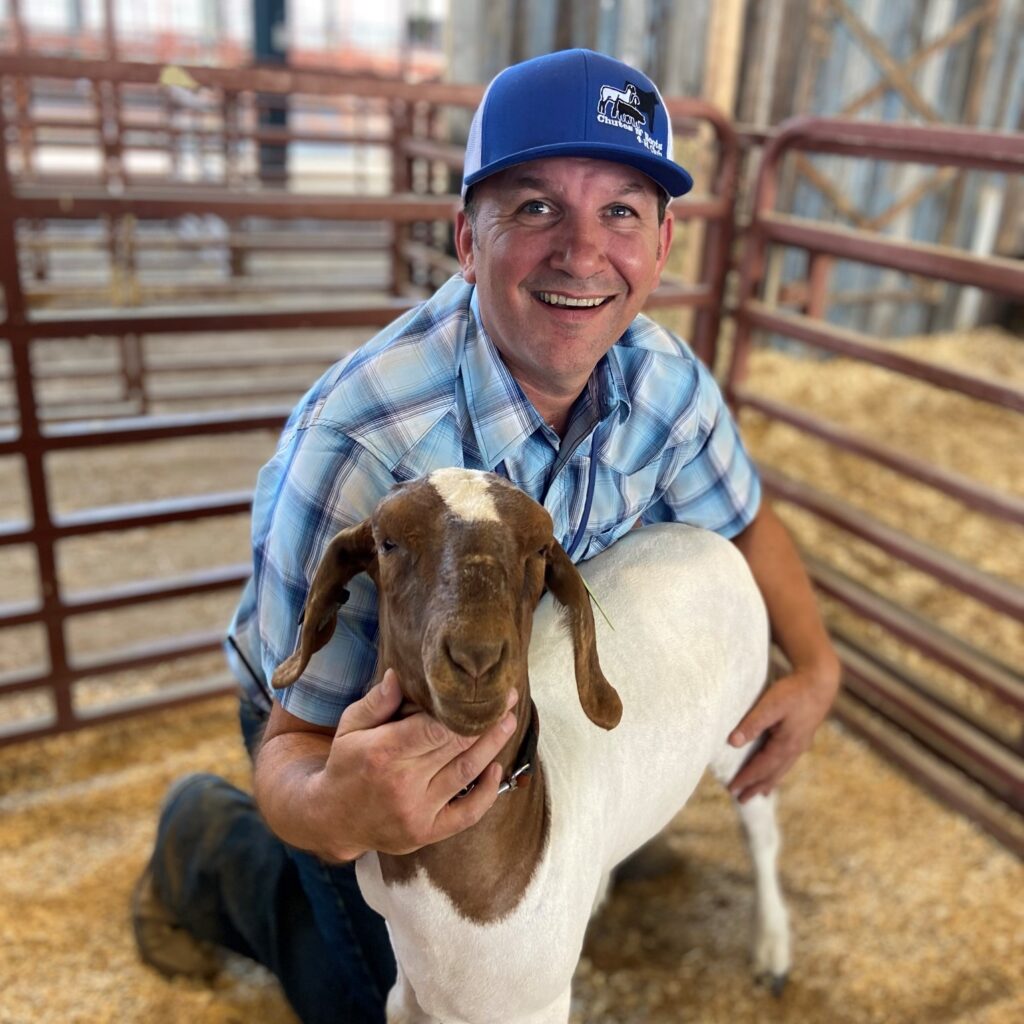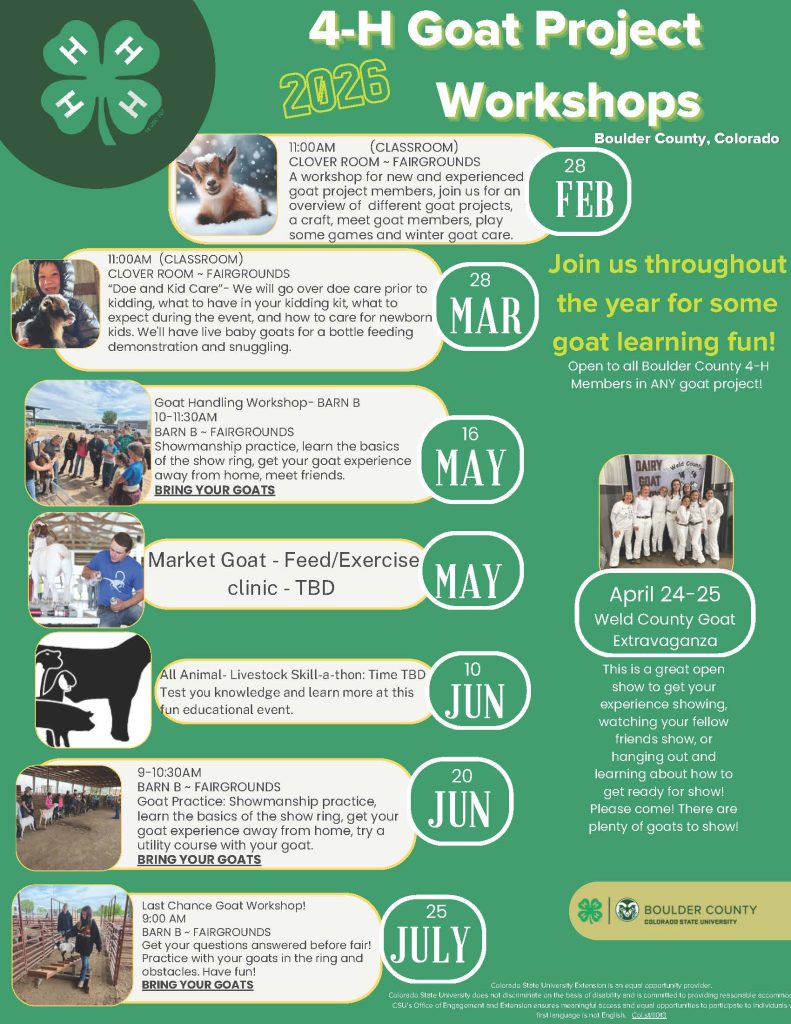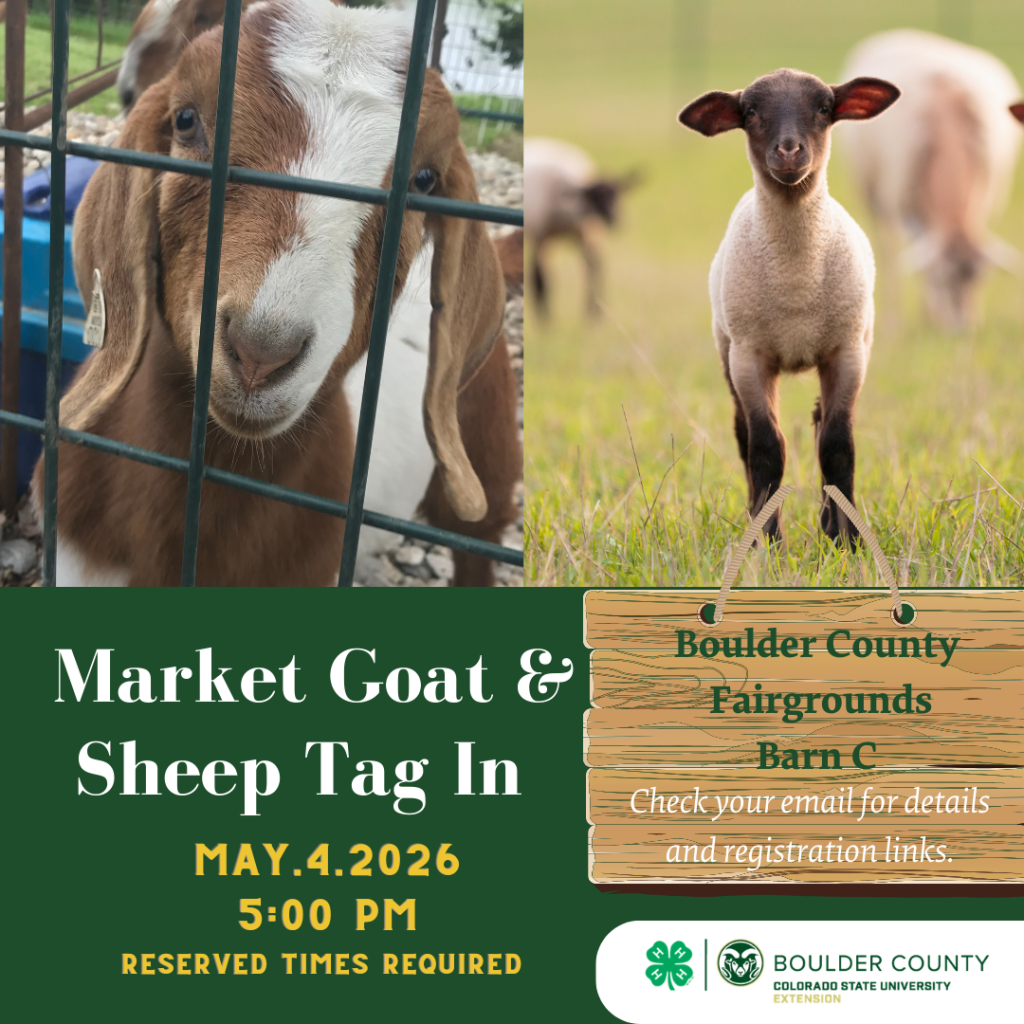Designed for those 4-H members who want to learn more about raising goat animals whether it would be for milk production, mohair, meat production, pets or packing.
Youth programs with goats generally focus around 4-H projects. Often these programs involve selection of animals and production for showing the animals at fairs and other livestock shows. Both registered and commercial (non-registered) animals can be shown in most goat shows, depending on the class. Show rules vary so check the rule book before you go to the show.
The object of the youth livestock program is to help youth develop important life skills by learning how to care for an animal and how to produce a high quality animal. The youth is expected to do the daily work of caring for and training the animal with minimal assistance from the parent or leader. This allows the youth to learn and grow. As the youth gains experience they should take on more of the responsibility of the project.
Members will receive a manual when they sign up for a goat project. For more information. Project levels are designed for members 8-18 years old, junior, intermediate and senior.
In Boulder County we have several different goat projects youth may participate in as their 4-H Projects. These projects are:
MEET OUR TEAM!
We are ready to help and support you in your 4-H livestock journey.

Boulder County Fair Market Goat
Project Superintendent

County Specialist CSU Extension
4-H Youth Development Livestock & Animals
Boulder County
QUICK LINKS
UPCOMING EVENTS/TRAINING/WORKSHOPS/SHOWS
RECORD BOOKS/E-RECORDS
Visit the 4-H State Website. Select your project type (e.g., Animal, STEM, Home Design). After selecting the project type, you’ll see a list of specific projects (e.g., Horse, Dog, Photography). Click on your specific project to access manuals and e-record book links.
| RECORD BOOKS/E-RECORDS: 4-H Record Books are also called e-Records. Each project has its own record book that members are required to complete each year. Record books have a few times to be checked on progress throughout the year: 1. June- your 4-H leader will be sure your books are started and up to date. 2. Prior to showing at the Boulder County Fair, your record books will be checked by your superintendent to be sure they are up to date and complete as can be in order to participate and show at the fair. 3. Final Livestock record books are due to be received at the extension office by the second Thursday in September. (please note: your 4-H Leader may need an earlier deadline for review and signatures.) |
TAGGING AND ID
ANIMAL ID REQUIREMENTSListed below are some simple checklist steps to be sure you are prepared and ready for the day.
Market Lamb & Market Goat Tagging – Monday- May 4th, 2026
Where: Boulder County Fairgrounds, Barn C
When: Thursday, May 4, 2026 | 5:00 – 7:00 PM (Time spots reserved—see signup below)
Sign Up: https://tinyurl.com/marketgoatsheeptag2026
We will be using a drive-through process in Barn C, with traffic flowing east to west. Please be prepared before arrival.
Requirements:
- Male market animals must be castrated or banded
- All animals must have scrapie tags (Sale Committee Rule)
- Market goats must be dehorned or have horns “tipped” before exhibition
- Premises ID must be provided
- Paperwork must be completed
- $5 per tag – cash or check only
Reminder: Take a photo of your paperwork before turning it in. It is your responsibility to ensure your animals are identified, tagged, and all forms are completed correctly.
Questions? Contact us. See you at tagging!
Be prepared-
Fill out the tag-in form for market sheep or market goats or both. It is also available at the 4-H Extension website
Tag Fees-
There is a $5.00 fee for each tag. Staff will be collecting the fees and will be located at end of Barn C. (Exact cash appreciated)
Traffic Flow- see attached diagram
- Enter from the EAST fairground entrance and go to the EAST SIDE OF BARN C
Follow signs- There will be ONE EAST side entry point into BARN C. (we will try to have two entries, so watch for signs) Stop before entering to be sure your paperwork is complete.
- If you forgot your paperwork at home, get new forms and complete prior to coming into the barns.
Once paperwork is completed (All except ear tag numbers), drive into barn.
Animals should be removed from the vehicle/trailer for tagging & retinal scan and weighing.
Sheep and Goats will both be weighed this year. They are required to have halter/lead rope on each one of them. Please be prepared with enough halters for each animal so we can move through process quickly.
Exit WEST Upon completion of tag-in, drive outside of the barn to park, turn in tag-in forms, and pay.
USEFUL INFORMATION
RESOURCES
Check out the latest videos for the Goat Project
Get Ready for Kidding Workshop: This video covers doe care prior to kidding, what to have in your kidding kit, what to expect during the event, and how to care for newborn kids.
ANIMAL ID REQUIREMENTS
Sign up for a time for tag day
Meat Breeding Does Animal ID Process:
- All breeding does must be identified by the species identification deadline of the last Thursday in April each year. This process is done through 4HOnline. More information can be found at: https://boulder.extension.colostate.edu/4h/animalid/
Identification & Weigh-In Process
Process for Market Goats:
- Fill out the tag-in form. It is also available at the 4-H Extension website.
- Tag Fees – There is a $4.00 fee for each tag. 4-H Staff will be collecting the fees and will be located mid aisle.
Traffic Flow (Map)
- Enter from the SOUTH fairground entrance to Barn C
- Head from EAST to WEST to the edge of Barn C on the east side
- Stop outside of the East side of Barn C and get your paperwork if you did not complete it yet. Be sure your paperwork is complete BEFORE driving into the EAST Side of Barn C.
- We will try to have two sides of entry into the barn (Follow the signs the day of the event.)
- You will exit out the WEST side of Barn C and go NORTH out of the Fairgrounds – (once fees are paid and paperwork turned in.
Tag-In will proceed in the following order:
Fill out one nomination Tag in Form for each animal. State fair forms are used form Boulder County (Note the top left side of form). You will need to know your project animal’s breed, sex and birth date.
Pay a $4.00 Tag fee per animal. Fee covers the cost of tags, tag equipment, scale equipment retinal scanning equipment. Remember to include fee in your record book.
Tag-In Form for Market Goat – Coming Soon
2. Ear Tags:
Establish the ownership of each animal. Each project animal is required to be owned and nominated to one specific exhibitor. In other words, siblings must specify ownership of each animal and may not share or swap animals after Tag-In. For example, goat 101 cannot be listed as John’s goat and later transferred to his sister, Mary.
Fill out Scarpie Tag Number and animal name on Tag in Form. After animal has been tagged by a volunteer, check that the correct tag number is now listed on the nomination form for that animal.
3. Weigh:
Push your animal(s) through to the scale. It is highly recommended that your animal have a halter or collar on when going through the scale.
Hand your completed Tag in Form to the volunteer at the scale. Check that the tag # on the form matches the tag # on the animal that is on the scale.
Note: Male market animals must be castrated or banded and must have scrapie tags in place by the May tag-in. Market goats must be dehorned or have horns “tipped” before exhibiting.
4. Retinal Scan:
Bring each animal individually to the designated person for retinal scanning. Retinal scanning is required to be eligible for market goat classes at the Boulder County Fair and Colorado State Fair. Retinal scanning works like a fingerprint to provide precise identification of an animal in case a tag is lost or questions arise. All Champion and Reserve Market Goats will be scanned at the Boulder County Fair to verify identity.
5. Final Paperwork review:
Bring each completed form to the end of the barn and turn in. Please check your paperwork to be sure animals are identified correctly. This is your final chance for any updates. Take a photo of your completed paperwork for reference. Turn in paperwork to 4-H Staff members
Scrapies Requirements:
Scrapie is a disease of the central nervous system in sheep and goats. It is always fatal (always results in death), and there is no cure for it. Sheep and goats are usually exposed to it when they are newborns, but don’t show symptoms until they are older, sometimes not for five years! All sheep and goat producers, including 4-H’ers, must help to eradicate this disease.
What you need to know: All Market goats need to have a Scrapies tag in their ear.
How do I get scrapies tags for my goats?
Request your FREE tags and tagger, just call 866-USDA-TAG 866-873-2824.
If you are planning on exhibiting/selling any female sheep/goats; sexually intact male sheep/goats OR own any sheep/goats older than 18 months old in Colorado you will need tags. It is recommended to have tags in place by Market Nomination day so you know you are good for fair and required to be eligible to show/sell goats or sheep at the Boulder County Fair. )(NOTE: NEW IN 2024: ALL MARKET SHEEP AND MARKET GOATS are REQUIRED to have a scrapies tag for the Boulder County Fair (regardless of sex/age) due to the new policy set by the Livestock Sale Committee.
Key 4-H Pages
Pages
- 4-H Shooting Sports Projects
- 4-H Livestock General Information
- 4-H Beef Project
- 4-H Cat Project
- 4-H Cavy Project
- 4-H Dairy Cattle Project
- 4-H Dog Project
- 4-H Dairy Goat Project
- 4-H Market/Breeding Goat Project
- 4-H Utility Goat Project
- 4-H Horse Project
- 4-H Poultry Project
- 4-H Rabbit Project
- 4-H Sheep Project
- 4-H Swine Project
- 4-H Leader Resources
- 4-H Councils and Committees
- 4-H Outreach
- 4-H Scholarships



